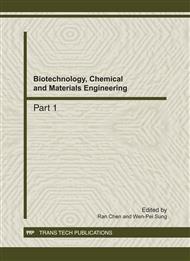[1]
L. Fambri, A. Pergoretti, S.D. Incardona, C. Migliarisi. Biodegradable fibres of poly(L-lactic acid) produced by melt spinning. Polymer, Vol. 38 (1997), p.79.
DOI: 10.1016/s0032-3861(96)00486-7
Google Scholar
[2]
L. Zhang, S.H. Goh, S.Y. Lee. Miscibility and crystallization behaviour of poly(L-lactide)/poly(p-vinylphenol) blends. Polymer, Vol. 39 (1998), p.4841.
DOI: 10.1016/s0032-3861(97)10167-7
Google Scholar
[3]
X. Zhang, M. Kotaki, S. Okubayshi, S. Sukigara. Effect of electron beam irradiation on the structure and properties of electrospun PLLA and PLLA/PDLA blend nanofibers. Acta Biomaterialia, Vol. 6 (2010), p.123.
DOI: 10.1016/j.actbio.2009.06.007
Google Scholar
[4]
Y.J. Li, H. Shimizu. Improvement in toughness of poly(L-lactide) (PLLA) through reactive blending with acrylonitrile-butadiene-styrene copolymer (ABS): Morphology and properties. Eur Polym J, Vol. 45 (2009), p.738.
DOI: 10.1016/j.eurpolymj.2008.12.010
Google Scholar
[5]
Y. Kikkawa, T. Suzuki, M. Kanesato, Y. Doi, H. Abe. Effect of phase structure on enzymatic degradation in poly(L-lactide)/atactic poly(3-hydroxybutyrate) blends with different miscibility. Biomacromolecules, Vol. 10(2009), p.1013.
DOI: 10.1021/bm900117j
Google Scholar
[6]
H. Tsuji, G. Horikawa. Porous biodegradable polyester blends of PLLA and PCL: physical properties, morphology, and biodegradation. Polym Int, Vol. 56 (2007), p.258.
DOI: 10.1002/pi.2150
Google Scholar
[7]
K.C. M. Hoang, Tseng, W.J. Shu. Degradation of polyethylene succinate (PES) by a new thermophilic Microbispora strain. Biodegradation, Vol. 18 (2007), p.333.
DOI: 10.1007/s10532-006-9067-5
Google Scholar
[8]
Z.B. Qiu, S. Fujinami, M. Komura, K. Nakajima. Miscibility and crystallization of poly(ethylene succinate)/poly(vinyl phenol) blends. Polymer, Vol. 45 (2004), p.4515.
DOI: 10.1016/j.polymer.2004.04.033
Google Scholar
[9]
T. Ikehara, Z.B. Qiu. Penetrating spherulitic growth in poly(butylene adipate-co-butylene succinate)/poly(ethylene oxide) blends. Macromolecules, Vol. 38 (2005), p.5104.
DOI: 10.1021/ma0502809
Google Scholar
[10]
T. Maharana, B. Mohanty, Y.S. Negi. Melt-solid polycondensation of lactic acid and its biodegradability. Prog Polym Sci, Vol. 34 (2009), p.99.
DOI: 10.1016/j.progpolymsci.2008.10.001
Google Scholar
[11]
J.M. Lu, Z.B. Qiu. Fully biodegradable blends of PLLA and PES: Miscibility, crystallization, and mechanical properties. Polymer, Vol. 48 (2007), p.4196.
DOI: 10.1016/j.polymer.2007.05.035
Google Scholar
[12]
R.Y. Wang, S.F. Wang, P.M. Ma. Toughening modification of PLLA/PBS blends via in situ compatibilization. Polym Eng Sci, Vol. 49 (2009), p.26.
DOI: 10.1002/pen.21210
Google Scholar


